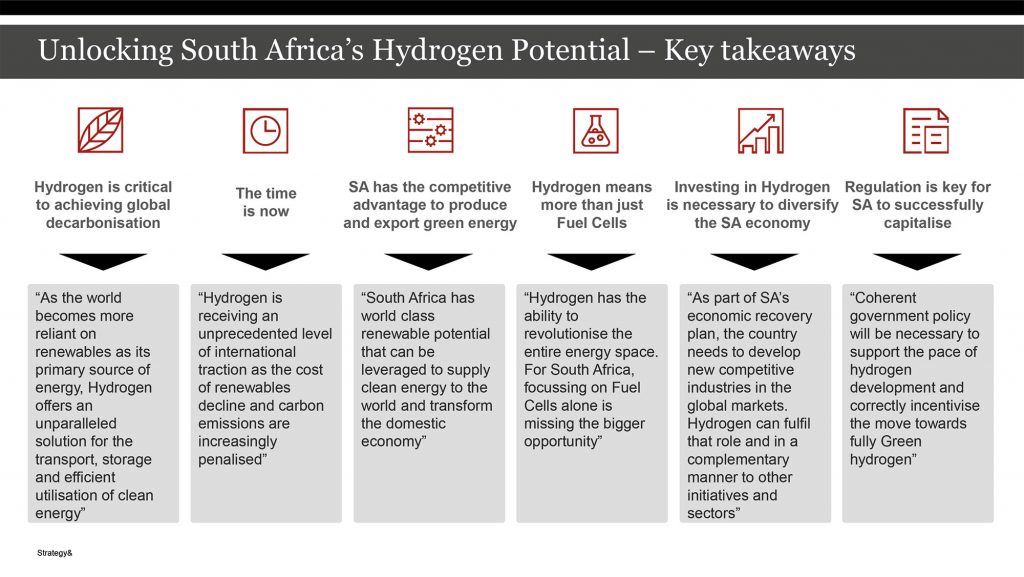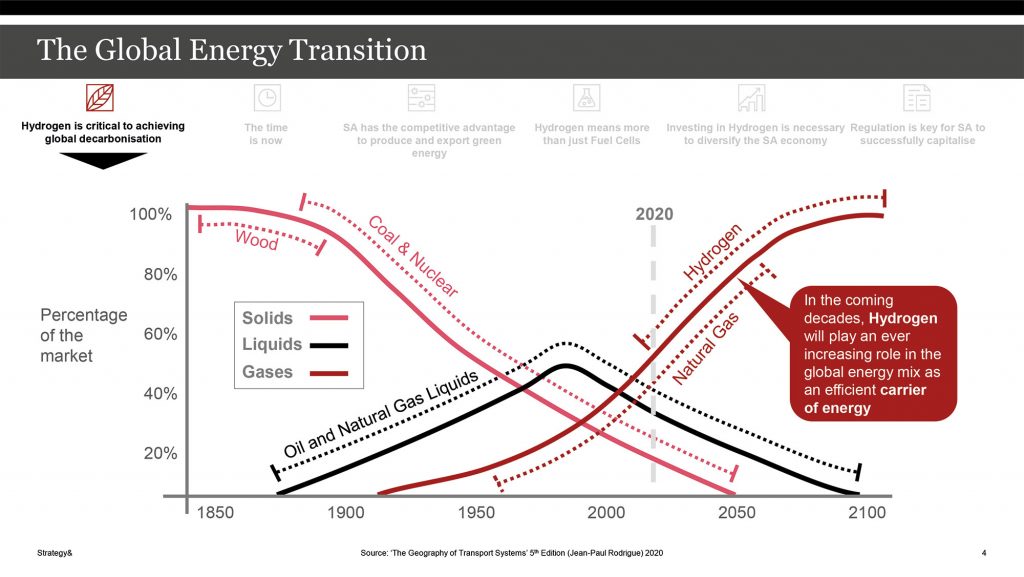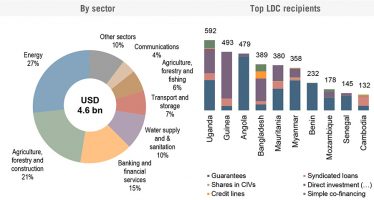PwC: South Africa Has an Unprecedented Opportunity to Capitalise on the Rapidly Developing Global Hydrogen Economy
Hydrogen can be a game changer for the South African economy. Opportunities exist for South Africa to partake in the global hydrogen economy but will depend largely on investments in renewable energy generation, as well as the development of a clear hydrogen strategy.
All over the world, interest in hydrogen as a vector for clean energy is growing, as industries and governments investigate and implement national decarbonisation strategies. With the rapid growth in renewable electricity and falling costs of wind and solar power, the opportunity to produce zero carbon hydrogen has caught the attention of global energy players. With the world increasingly turning towards countries that have optimal renewable energy resources to provide the clean energy of the future, South Africa is in an extraordinary position to revolutionise its own economy and supply green hydrogen to the world.

Key takeaways: Unlocking South Africa’s Hydrogen Potential.
PwC South Africa recently issued its inaugural ‘Unlocking South Africa’s hydrogen potential’ report released today.
Hydrogen Is Critical to Achieving Global Decarbonisation
As the world becomes more reliant on renewables as its primary source of energy, hydrogen offers an unparalleled solution for the transport, storage and efficient utilisation of clean energy.
In the past few decades, the world has already seen the massive growth in both renewable energy technology and implementation. As the pace on innovation has accelerated and the benefits from economies of scale were realised, the landed cost of renewable energy has tumbled. In many cases, renewables are on par or cheaper as compared to their carbon intensive counterparts.
“The outlook for the global energy sector will see wind, solar and hydro accounting for an ever-increasing proportion of our energy needs.”
The outlook for the global energy sector will see wind, solar and hydro accounting for an ever-increasing proportion of our energy needs. It is estimated that by 2050, 85% of global electricity production will be sourced from renewables.
As the world moves towards renewables as its primary energy source, production will become increasingly geographically constrained, necessitating increased cross-border transportation and storage of green energy. With the impracticality of long-distance electricity transmission and the prohibitive cost of large scale battery storage, it just so happens that the best option for the transport, storage and efficient utilisation of clean energy lies with the same element that makes up 75% of the mass of the universe; hydrogen.
Hydrogen is exceptionally energy dense per unit of weight and is no more difficult to store and transport than liquified natural gas (LNG). Through its direct combustion, its use in fuel-cells and its use as an industrial feedstock, it can decarbonise a greater range of sectors than renewable electrical energy alone. Hydrogen can be produced in collaboration with renewable energy almost anywhere in the world. Importantly, in the context of global climate change, the use of hydrogen that is produced from renewable energy produces no carbon emissions.
The Time Is Now
Hydrogen is receiving an unprecedented level of international traction as the cost of renewables decline and carbon emissions are increasingly penalised.

The Global Energy Transition: Hydrogen is critical to achieving global decarbonisation.
Global momentum is growing across the hydrogen industry, with few sectors likely to remain untouched by this upcoming energy revolution. At the beginning of 2020, the global hydrogen project pipeline, across grey, blue and green projects stood at $95 billion. The carbon abatement of the blue and green hydrogen projects in this pipeline will be large enough to offset the annual carbon emissions of Nigeria.
Progress has been seen with the launching of national policies and government funding initiatives, including national hydrogen roadmaps, building upon the momentum of existing pilot programmes. Strategic memorandums of understanding (MoUs) between hydrogen countries that are ideally suited to the production of hydrogen and countries who have aggressive decarbonisation targets and want to use hydrogen are clear signs of the traction in the market.
South Africa Has the Competitive Advantage to Produce and Export Green Energy
Hydrogen is categorised into three broad types; grey, blue and green. Classified as such based on the quantity of carbon that is emitted in their production and the production process itself. Grey hydrogen is produced from natural gas (through steam methane-reforming) or from the gasification of Coal. Although grey hydrogen still accounts for most of the global hydrogen supply, its relative high carbon intensity has seen a decline of its popularity.
Blue hydrogen is produced from the same carbon intensive feedstocks as with grey but is twinned with some type of carbon capture technology, thus vastly increasing the green credentials of the final hydrogen gas. Blue hydrogen allows companies or countries who have previously invested into grey hydrogen production to elongate the lifespan of their assets and allow for the continued utilisation of already identified fossil fuel resources.
Where most investor attention is being focused is on green hydrogen. This production method utilises electricity generated through renewable energy (wind, solar or hydro) and splits pure water through an electrolysis process into hydrogen and oxygen molecules. As the cost of renewable energy and electrolysis technology has plummeted in recent years, green hydrogen is ever increasingly reaching parity with its more carbon intensive counterparts. In countries with high renewable energy potential such as Saudi Arabia, Australia and Chile, green hydrogen has already become the preferred investment choice.
As South Africa has world leading solar and wind resources, these early mover green hydrogen producing countries have important implications for the future of the South African economy. If the South African can properly leverage these resources and combine it with a fertile investor and regulatory environment, South Africa could transition to an exporter of green energy to the world alongside decarbonising large sectors of its own economy.
Hydrogen Means More Than Just Fuel Cells
For the past decade or so, hydrogen development in South Africa has been largely driven through the initiatives of the mining sector. There have been projects from some of the country’s largest PGM miners such as Anglo American Platinum’s fuel cell electric vehicle (FCEV) mining truck at Mogalakwena mine or Impala Platinum’s FCEV forklift fleet at the Springs refinery. These pilot schemes have been heavily focused on the use of PGMs in the catalyst plates of fuel cells. Although these projects are a good start to bring hydrogen technology into the transportation space, the focus of their application is quite narrow. There exists a far larger opportunity to leverage the unique properties of hydrogen to revolutionise how we think about energy.
When looking at what hydrogen can do, it is easiest to break it down into the four pillars of the hydrogen economy:
Transportation – Across both the road and rail sectors, fuel cell technology can provide unparalleled performance for vehicles. These FCEVs can outperform their fossil fuels and battery counterparts through better power to weight efficiencies, faster refuelling times and significantly longer ranges. Across the aviation and shipping industries, hydrogens ability to produce carbon neutral fuels that can run through existing traditionally carbon intensive technologies such as diesel engine and jet turbines, makes it unmatched in its ability to decarbonise the transport sectors.
Building heat and power – In countries that have existing natural gas networks, hydrogen offers a simple decarbonisation alternative. If green or blue hydrogen is blended into these gas grids, then the largest carbon emission in the household (heating and power) can be entirely offset. Pilot schemes that aim to transition existing natural gas grids over to running on 100% hydrogen are already underway in Northern Europe. In areas where access to power or reliability of power are problematic, Hydrogen solutions are already being used to provide an alternative to carbon intensive diesel generators. Fuel cells are already widely used in the Southern Africa telecommunication infrastructure for off-grid power.
Industrial heat and feedstock – Perhaps the most compelling future area for hydrogen is in its use for both industrial heat and in chemical feedstocks. Either combusted on its own, or in combination with oxygen, hydrogen can produce extremely high temperatures. If green hydrogen is utilised for this purpose, then offers perhaps the only plausible decarbonisation alternative for large scale industrial heat users. Hydrogen is already widely used at the feedstock for the production of fertiliser (ammonia) and in the production of liquid fuels. Currently the vast majority of the hydrogen used in these processes is sourced from natural gas or coal. If the hydrogen needed for these processes were to be sourced from renewable energy, via electrolysis, this would fully green these fuels and feedstocks. As it currently stands green hydrogen is the only plausible option to decarbonise industrial feedstock.
Energy sector – One of the key issues facing the renewable energy sector is how best to efficiently store the energy created in order to achieve smooth supply and maximise asset utilisation. Currently, there is limited capacity to hold energy within grid systems and the massive cost involved with battery storage at scale makes it a poor option. Hydrogen can help solve the intermittent supply issues associated with renewable energy by utilising electrolysis to convert excess electricity into hydrogen during times of oversupply. This hydrogen can then be utilised to generate power through either fuel-cell or direct combustion in gas turbines when it is needed.
Investing in Hydrogen is Necessary to Diversify the South African Economy
Traditionally, South Africa has been a net importer of energy, especially in the liquid fuels and gaseous sector – development of the hydrogen production sector will be pivotal in cementing South Africa’s position as a net exporter of clean energy and major earner of foreign currency to our economy, but also to secure clean domestic energy supply that is de-risked from supply chain disruptions and currency devaluation.
One of the key issues for South Africa’s energy sector is that as a country we are reliant on energy imports, specifically in the liquid fuels and gaseous space. Development of the South African industrial economy has been hamstrung by the slow development of much needed infrastructure development such as the delay on LNG import terminals and required supporting infrastructure to enable industrial development. Naturally, this is an extremely volatile situation as the economy and households are subject to any supply chain disruptions, market changes, and the impact of currency devaluation.
World energy production is becoming increasingly geographically constrained, necessitating the need for cross-border transportation of storage of energy. Being able to leverage our world-leading renewable power potential, South Africa will be well positioned to secure its own domestic supply of energy that will anchor economic growth, but more importantly become a net exporter of energy in the form Hydrogen enabled chemicals, fuels and products to high demand markets in Europe and Asia. The large renewables investment needed to generate sufficient quantities of Hydrogen for export will bring South Africa’s landed cost of energy down and a portion of this capacity can be used to support our domestic grid, relieving the load on state utility, potentially at a lower cost to consumers. Furthermore, development of a new hydrogen export industry will create numerous jobs along the value chain and enhance the specialised skills pool in the country.
Regulation is Key for South Africa to Successfully Capitalise
Progress is being made in the South African hydrogen space, with the first government led hydrogen roadmap under development and the Green Hydrogen Atlas-Africa initiative highlighting South Africa’s potential to the global community.
However, in order to fully realise the benefits of the hydrogen economy the following steps need to be taken:
- Finalise the South Africa Hydrogen strategy and roadmap – where to play, how to start, how we support and incentivise (Currently under development)
- Clear Ministerial direction around which government department will champion hydrogen (e.g. Energy or Trade and Industry)
- Assesses the need for regulation in enabling a competitive market (regulatory hurdles need to minimised and processes streamlined)
- Incentivise early investment and just transition from red, to blue, to green Hydrogen (e.g. sector specific Special Economic Zones, tax credits, policy certainty)
- Fast tracking of renewable energy licensing used for hydrogen production
- Review and strategy for local content and local skills development
- Signing of collaboration agreements between hydrogen producers, off takers and technology players (similar to the Japan-Australia and Germany-Morocco MoUs signed in recent years)
If South Africa commits to a certain, transparent, stable and accountable policy environment for hydrogen, the country can reap the significant rewards on offer. The country stands in an unprecedented position to benefit from the global energy transition and transform itself in one of the green energy majors of the world.
About the Author

Author: Jonathan Metcalfe
Jonathan Metcalfe is South Market Lead for hydrogen and an economist in PwC’s Strategy& division.
Jonathan’s has a core focus on the development of South Africa’s hydrogen economy. Jonathan has extensive experience in mining and resources, particularly in cost optimisation, market entry strategy and infrastructure development. Jonathan is an economist by training and has considerable knowledge in financial and risk modelling.
You may have an interest in also reading…
Emerging Managers Summit
The Radisson Blu Aqua Hotel Chicago, Chicago, IL May 30-June 1, 2012 If you are looking to expand and diversify
OECD: Plugging the SDG Financing Gap
Ensuring Blended Finance can mobilise private finance, particularly in the Least Developed Countries and towards Social Sectors, will require a
Connie Hedegaard, EU Commissioner for Climate Action: Breaking Europe’s Imported Fossil Fuels Addiction
Europe is by far the largest importer of fossil fuel in the world. Recent developments in Ukraine, Syria and Iraq











































































